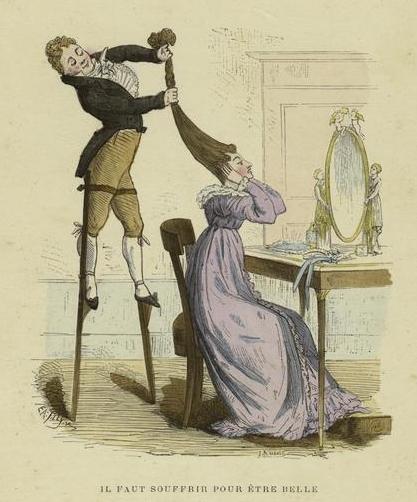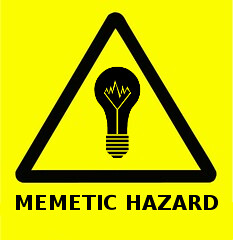So, as previous entries have already indicated in abundance, I'm currently reading a book called Dressing the Elite: Clothes in Early Modern England. It's by no means a terrible book, but it does exemplify a phenomenon that I've noticed, in my diletantish way, in a lot of recent historiography: the baleful influence of the perceived need to make an argument. Dressing the Elite is, at bottom and at its best, a collection of citations, anecdotes, and examples, many of them funny, most of them interesting — but it doesn't exactly make a point. It just sort of assembles different materials pertaining to clothes from a range of disparate sources and writes sentences around them — a bit of summary, a bit of light analysis. There's certainly some light shed on what people were wearing back then and just how intensely they worried about it, but nothing earth-shaking. If you ask me, though, that's just fine. There's nothing wrong with compiling information, publishing it, and moving on. This is how people learn about things. It's a valuable enough public service — maybe not so valuable that a book needed to be printed putting this stuff out there, but if we lived in a world of fully electronic academic publishing, it would most definitely be worthwhile to let this work circulate on the internets.
But because the academia of today insists that scholarly works can't just compile information but must also make contentious, counterintuitive, non-commonsensical claims, Dressing the Elite ends up going in for a lot of dodgy, secondhand critical-theory nonsense that doesn't really help anyone understand anything. It's a pose, not an argument — but it looks enough like an argument to pass for one. For instance, Vincent (the author) mentions how pretty much everyone who writes about sumptuary law says that it was kind of dumb, not really enforced, never worked, etc. But she follows the lead of the plagiarist Alan Hunt (who was attacked in these "pages" on November 26 — no links, catdogs, I'm offline!) in scare-quoting this whole line of discussion as, like, totally "obvious." Therefore wrong.
Tempting as it is to accept this at face value, Hunt, from his revisionist position, warns us against such easy assumptions. To think so is to fall into the trap of equating the enforcement of a law with its validity and significance (Vincent 140).
You know, I would have thought that was a pretty safe trap to fall into in most cases, if by "significance" you mean "significance to the average person at the time, or let's say to more than 1% of the population of the country." And I have no idea what "validity" is supposed to mean there — a law that goes unenforced is certainly still "valid" if it was passed by means of the proper procedure, but all that means is that it's a law.
We're supposed to be impressed by the counterintuitive move of sidestepping the enforcement issue, but the problem is that neither Vincent nor Hunt have actually uncovered any evidence that previous researchers missed. So they just try to spin it differently: "Hunt points out that the paradox at the heart of the sumptuary project is that, although supported by the majority, it was impossible to enforce compliance with its provisions. 'Indeed enforcement always ran the risk of alienating the broad consensus that favoured the existence of such laws'" (Vincent 142–3). The idea is that people were sort of in favor of ending excess in apparel, but they didn't want to stop wearing fancy clothes themselves, so they might favor a law about it, but they wouldn't really follow it.
This is just a "human nature" point restated in slightly more pretentious terms by people who would shudder to be associated with the notion of a "fixed," "ahistorical" human nature: people kind of want to punish their neighbors for stuff they do, but they don't want to be punished themselves. Not that profound. But in the course of dressing up this point, Vincent and Hunt casually make up a bunch of stuff. "The sumptuary project" (there's that goddamn word again) was "supported by the majority"? The majority of whom? Occasionally a majority of the House of Commons and the House of Lords would vote for one law or another, but plenty of these laws failed to command majority support. But the unqualified use of "the majority" clearly hints at a broader meaning: a majority of the population of England. But obviously there weren't public-opinion polls in the 17th century. And if there had been, they wouldn't have been particularly relevant to this issue. No one has a clue whether or not the majority supported sumptuary laws or even knew about them, but through sheer rhetorical oomph Vincent & Hunt can kinda sorta pretend they do, even though they would deny it if pressed. Likewise there's that bit about "broad consensus" — these are just words. How broad? Give me some numbers, Hunt. You almost certainly don't have any, because votes in Parliament weren't counted with anything like consistency during this period.
Vincent moves on to a pretty cute story about how the then Prince Charles and the then Marquis of Buckingham got caught passing through France wearing crappy disguises — fake beards that fell off. French dudes were like, "Um, you guys are hell of shady with those fake beards; what gives?" They were like, "Here is a bribe" (I think). The end.
But Vincent can't just stop at telling a cute story, so she has to ask silly questions like "with their disguise but not their identities exposed, why were these men so questionable that their movements had to be marked and controlled?…[W]hat was so transgressive about not being as they seemed?" I mean, isn't this kind of, well, obvious? Disguises in the night = thieves. You wear a disguise when you don't want to get caught for something. It's not "transgressive"; it's just suspicious. "Marked," "controlled," "transgressive," the idea that caring about differences between "being" and "seeming" makes you an authenticity-obsessed reactionary with weird sexual feelings: these are just stupid vocabulary tricks that give a patina of critical-theory gravitas to a kind of affected ignorance about why someone would be worried that Englishmen with fake beards were wandering around the countryside at night. Hell, I'd be worried too if I were a 17th-century French guy, and I certainly don't have any weird sexual feelings.
Vincent also riffs on how everyone hated vagabonds and vagrants and were super-scared of them. All of those attitudes go, of course, into intense scare quotes, because we postmodernists have to love and cherish the rootless and the marginal. Okay, fine. The vagrants got a raw deal, their lives were terrible, and the noblemen and gentry were major assholes. But why does this mean we have to pretend that they were just hallucinating the dangers? Vagabonds killed and stole and did unpleasant things, which made it scary to go around at night; you can retain sympathy for them, or claim that the fear was still overblown in proportion to the severity of the danger, but those positions are too obvious to take, so Vincent has to basically suggest that all the fears about vagabonds were invented. Because, I don't know, everyone was scared of cross-dressers.
I've kind of lost my thread here, and I'm sure no one is interested in reading more examples of poorly justified arguments about 17th-century English clothing. But my bigger, equally poorly justified argument is this: Vincent's heart isn't really in all this hand-waving wankery. She doesn't try especially hard to make it compelling. Maybe that's simply because she knows that her audience will just accept that this is the way you talk about "the body" and such nowadays. But I feel like what actually happened was that she got interested in a funny little topic, drew up a list of cases to analyze, and forced herself to make more of them than she really had a right to, because That's What Academics Do. What a waste. Why not just let it be what it is?
This is sort of related to a point that Unger makes in Knowledge and Politics when he distinguishes between the classical humanities — grammar, theology, and legal doctrine — and the corresponding social sciences — linguistics, the sociology of religion, and the sociology of law. No one really does the former anymore: developing and recapitulating old ideas with minor adjustments, treating oneself as part of the same tradition as the stuff you're analyzing instead of as a distanced, third-party observer. It's more modest, more boring, maybe, but there's no reason to think that it has to be less rigorous or precise. And it's among the kinds of stuff that I really admire, come to think of it. Massive scholarly editions of esoteric old books, annotated novels, comics that refurbish but don't fundamentally alter characters like Cat-Man or Kite-Man or Plant-Man (all villains, incidentally): stuff that's ambitious in a limited but still occasionally major way, stuff that respects the past even as it moves beyond it, maybe recognizing that, yeah, it will probably never matter to anyone that this punctuation mark is a left bracket in Manuscript A but a left brace in Manuscript B, but fuck it, let's just mark it down anyway, because goddammit there is a thing called integrity in this world, and when we cut corners and fudge facts, we know we're doing it. And that's what makes it so dishonorable, even when the stakes are low and no one gets hurt.
That's why Alex is right to be annoyed that Marvel published a comic in which Spider-Man has a baby but has since refused to acknowledge that this ever happened. Sloppy and arrogant.
Happy birthday, Alex!
EDIT: I can't resist documenting my continuing annoyances.
With pseudo-scientific precision the rogues were sorted into complicated sub-groups, each of them named and explained.…Like insect specimens they were labelled and described, pinned to the page by the sharpness of textual observation (Vincent 157).
Well, we can hardly blame pamphlets from the late 16th century for being "pseudo-scientific" — science itself was "pseudo-scientific" back then. And the amount of violence inflicted upon the rogues by making up silly categories to put them in is roughly comparable to the amount of violence inflicted upon mullets or hipsters by those little books that do the same to them.









